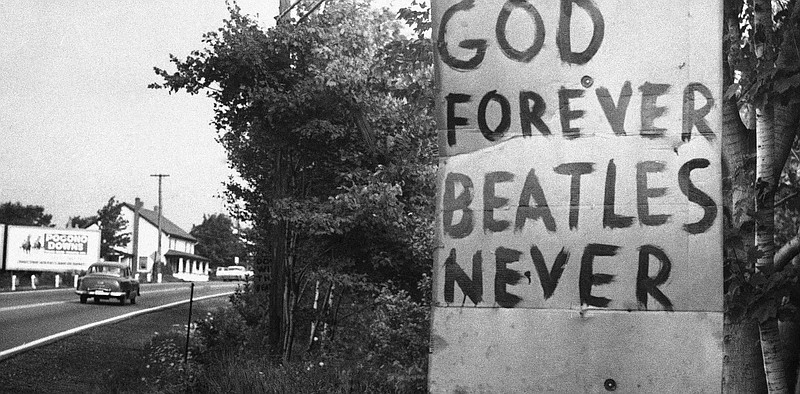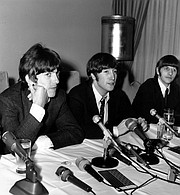Photo Gallery
Even after 50 years, John Lennon's "more popular than Jesus" comment still rankles local pastors
Letters to the editor
The following are excerpts from letters to the editor regarding the Beatles ban that were published in 1966 by the Chattanooga News-Free Press:* “It is encouraging and indeed a healthy sign that the majority of our people have taken exception to John Lennon’s blatant show of disrespect for Christianity. … This ‘rebellion’ is important, if for no other reason, in that it will demonstrate (financially) that the American sentiment favors the basis of the religion that founded our country, not a group of young men suffering from a serious lack of responsibility, respect and Moravian conviction.” — printed Aug. 12, 1966 and signed “A Former Beatles Fan”* “John Lennon has a right to attack the church, Christians or Christ Himself, but when he did, he just revealed the depravity of his own sinful heart. I shouted, ‘Praise the Lord’ when I read about the teenagers taking some action against the Beatles records. It proves we still have some young people who will stand up for Christianity.” — printed Aug. 13, 1966 and signed “Joe Sollars, evangelist”* “Regarding the Beatles’ controversy, don’t you think it would be much more effective if we adults kept silent and let the youngsters form their own opinions? I believe 99 percent of all the young people brought up in the church would feel indignant at this insult to their Lord if we parents would refrain from expressions our opinions too much.” — printed Aug. 16 and signed “One Who Tried It”* “The present furor over the religious inclinations of the Beatles is puzzling. All at once, there is this clamor to ‘ban the Beatles,’ and ‘Beatle-burning parties’ are becoming fashionable with the Watusi set. Have the cool crowds had their heads buried or do their forelocks inhibit reading and the din of folk rock hearing anything else? Even the squarest should know that the Bugs’ attitude toward religion has been reported repeatedly and has been common knowledge for years.” — printed Aug. 16, 1966 and signed “Robert C. Baker, Route 1, Box 108-D, East, Tennessee”* “Some have the definite impression that Lennon intended to brag. Quite the opposite is true. He only meant that people are turning more toward material wealth than religion. … In closing, I would like to agree on one thing. God’s mercy is great. If it were not, it would not be John Lennon who should be stricken dead, but all those who make his statement true.” — printed Aug. 16, 1966 and signed “Jan Belk”
Sometimes, all it takes to cause a tsunami is a ripple in the wrong place.
In August 1966, Tommy Charles, a Birmingham, Ala., radio deejay and Chattanooga native, read an excerpt of "How Does a Beatle Live?", an interview with John Lennon in Datebook magazine.
The piece, which originally ran in an English newspaper 50 years ago this month, touched on a number of topics, but Charles zeroed in on a statement by the singer describing what he saw as a general decline in religious fervor.
"Christianity will go," Lennon said in the interview. "It will vanish and shrink. I needn't argue about that; I'm right and I will be proved right. We're more popular than Jesus now; I don't know which will go first - rock'n'roll or Christianity. Jesus was all right but his disciples were thick and ordinary. It's them twisting it that ruins it for me."
The quote appears halfway through the Datebook piece, which had passed through the U.K. with nary a whisper of discontent, but Charles pounced on four words:
More. Popular. Than. Jesus.
"They can't get away with that sort of thing," the deejay said in a story that was published in the Chattanooga News-Free Press on Aug. 3, 1966.
Charles called Lennon's statement "absurd and sacrilegious" and declared an immediate end to airing any of the Fab Four's music on his station, WAQY-AM. According to News-Free Press coverage, he began issuing hourly "spot announcements" of a "Ban the Beatles" campaign and requested that listeners bring albums and other Beatles memorabilia to drop-off sites throughout Birmingham. These were to be burned in a "Beatle bonfire" on the night when the band came closest to Alabama during its 1966 U.S. tour, an Aug. 19 concert in Memphis.
Pitchforks were passed and torches lit as far away as Idaho, where radio stations started their own Beatles boycotts, according to News-Free Press coverage. Locally, the newspaper ran letters to the editor on a near-daily basis for weeks - predominantly in support of the "Ban the Beatles" campaign - and there were "Beatle burnings" in the area, including Fort Oglethorpe, Ga.
Fifty years later, local religious leaders remain divided on whether Lennon's statement was blasphemous or simply misconstrued.
The Rev. Doug Fairbanks, senior pastor of First Centenary United Methodist Church, says he has loved the Beatles since their music made its way to America while he was in high school. Now 69 years old, he thinks the protest was probably a knee-jerk reaction but, even if it wasn't, a band's temporary popularity is no match for the long-lasting influence Christianity has had on the world.
"At any given time in history, and certainly modernity, some people may be more popular than Jesus, but none, including the Beatles, will ever change the world as Jesus did," Fairbanks says. "We talk about something being popular, and that's kind of fleeting. There's no comparison [between the Beatles and Jesus] in the measure of the impact on the world."
Dennis Culbreth, 58, is the director of missions for the Hamilton County Baptist Association, an organization consisting of 107 Southern Baptist churches. He was 8 when Lennon's comment ignited protests, but he says, in retrospect, that they seem the words of a "poorly educated rebel who was a gifted musician."
"He speaks, like many today, out of emptiness and a lack of understanding the faith that changed the world one soul at a time," Culbreth says. "It is his tragic loss. If only his immature pride and sudden success hadn't blinded him to someone greater than any of us. Instead, he filled the spiritual vacuum in his life with first atheism and then later with the empty promises of a false Eastern religion."
Guy Templeton, who was a pastor in Ohio between 1970 and 1993 and now lives in Chattanooga, says he recalls discussing Lennon's quote and "preach[ing] against it" to his congregation. Now a member of Calvary Baptist Church in Red Bank, Templeton says thinking about the singer's words still angers him.
"The reaction in our fundamental circles were, of course, [that it was] considered blasphemy and disapproved and scoffed at," the former pastor says. "As far as his statement that he is more popular than Jesus, Jesus never did seek popularity, nor is He in the same category with John Lennon.
"John Lennon was a very troubled pathetic, flawed person He talked about peace and love but didn't seem to find either."
Despite Charles' bluster about Lennon's comment, he and his radio co-host at the time, Doug Layton, were actually fans of the Beatles, says J. Willoughby, a Birmingham-based musician and lifelong Beatles fan whose father, John Ed Willoughby, co-hosted the "TC and John Ed" radio show with Charles from 1975 until Charles' death in the mid-'90s.
Willoughby formed the Black Jacket Symphony, which recreates classic rock albums note for note, including the Beatles' "Sgt. Pepper's Lonely Hearts Club Band," the White Album (officially titled "The Beatles") and "Abbey Road," and has played often in Chattanooga. He says Charles hadn't even read the entire article before he went on air and is convinced the call to arms was just a way to stoke the fires and drum up phone calls and attention for the show.
"Tommy was not a very religious person, either - he wasn't a big churchgoer - but he knew his audience," Willoughby says. "He knew he was in the Bible Belt, and he knew it would bring people with them. Tommy had no idea what Lennon said in the article. He just saw the 'more popular than Jesus' thing, and he went with it.
"Tommy did this every day. I watched him do it with my dad. He'd just come in every day and find something to get on a tear about and let those phones roll."
Whatever Charles' intentions, the ripple of discontent began to swell, reaching other cities via a story written by wire agency reporter who happened to be in Birmingham at the time, Willoughby adds.
"He heard it and wrote a small column - a small blip - about it," Willoughby recalls. "It's just one of those strange, chaos theory moments, and then boom, boom, boom, the next thing you know, all of the South and Texas were on this bandwagon of banning Beatles records and were going to hold their own burnings. It was viral before things went viral."
Local entertainment outlets joined in the ban as well. According to newspaper archives, the Red Bank Drive-in Theater stopped showing The Beatles' film "Help!" and two radio stations, WMOC and WFLI, quit playing the Fab Four's music after station managers and program directors received almost 600 calls in support of the ban.
"Our stand is that we will not play the Beatles until the situation changes," WFLI manager John Eagle told the News-Free Press in a front-page story published the day after after Charles' announced the Birmingham ban. "We are letting the public decide."
When the Beatles began their 1966 U.S. tour - ultimately their last ever - they received death threats, and their shows were attended by Christian protesters who "screamed abuse" at them, according to the book "British Invasion" by Barry Miles.
When the band played in Memphis, Ku Klux Klan members staged a rally and record burning outside Mid-South Coliseum. The show was interrupted briefly after someone threw a firecracker at the stage, leading some to think shots had been fired, according to period reports.
Jan Belk, now marketing director for the Chattanooga Theatre Centre, attended that show and was one of many Chattanoogans who wrote to the paper during the anti-Beatles fervor. Then 14 years old, her letter was one of few to suggest people were over-reacting to and misinterpreting Lennon's statement. She says she still believes that 50 years later.
"I think people just had a gut reaction, as they still do with many things. [It was like] 'Let's not dig down and think about what's really being said, let's just fly off the handle and over-react,'" she says. "[These days] if he said, 'We're more popular than Obama,' nobody would care, but any time you put 'Jesus' in a sentence, it elevates the tension in the room."
The vehemence of the American response amazed the Beatles, especially Lennon, who had attempted to explain his position during a press conference in Chicago on Aug. 12.
"I'm sorry, I'm sorry I said it, really. I never meant it as a lousy, anti-religious thing," Lennon said, according to an Aug. 12, 1966, article in Chicago's The Morning Record newspaper.
"I was sort of deploring the attitude toward Christianity," he continued. "I wasn't saying the Beatles are better than God or Jesus. I used 'Beatles' because it's easy for me to talk about Beatles. I could have said 'TV' or 'the cinema' or anything popular. From what I've read or observed, it (Christianity) just seems to me to be shrinking, to be losing contact."
Contact Casey Phillips at cphillips@timesfreepress.com or 423-757-6205. Follow him on Twitter at @PhillipsCTFP.

